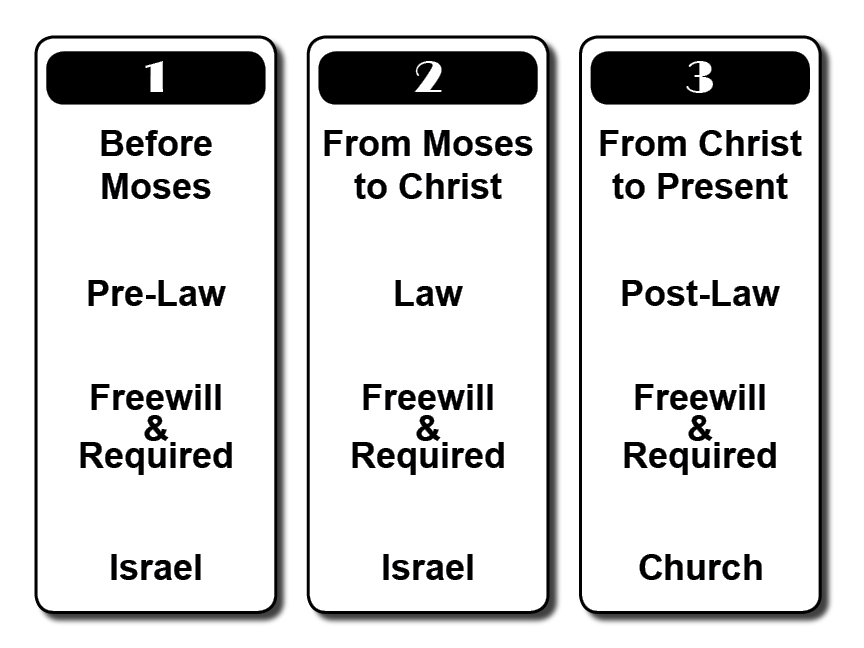4 of 4
SERMON SUMMARY
What is God’s plan for supporting the local church? Is tithing the God ordained method of funding the ministry of the local church, or is there another standard we are to use? A “tithe” simply means ten percent. Those who endorse tithing teach that we are to give ten percent of our income to support the ministry of the local church. Tithing is rooted in the teaching of the Old Testament as it related to the nation of Israel. The question we need to answer is not, “Is tithing biblical?” It clearly was an obligation for the nation of Israel when it was living under the Old Covenant Mosaic Law. The question is, “Is tithing an abiding principle for the church, living as we do, under the New Covenant?”
In order to make this determination, it is helpful to divide history into the three time periods shown in the chart shown here: Also note that throughout biblical history, giving has fallen into two basic categories: freewill giving and required giving. Freewill giving is directed toward the Lord in an attitude of love and sacrifice. Freewill giving is encouraged, but the amount is voluntary and unspecified.

Examples of freewill giving during the period before Moses include: Genesis 4:3-4; 8:20; 12:7; 13:18; 14:20; 28:22. During this period before Moses there also was required giving, in which the proportion was specified (Genesis 41:34; 47:24-26 tell of a taxation to fund the government of Egypt so that it could meet the needs of its people during times of famine.) This is the only indication that an amount was ever prescribed in pre-Mosaic times. All other offerings were completely freewill offerings.
Examples of required giving during the period from Moses to Jesus are: [1] the Levites Tithe, 10% (Leviticus 27:30-33); [2] the Festival Tithe, 10% (Deuteronomy 12:6-7); [3] the Poor Tithe, 3.33% (Deuteronomy 14:28-29); [4] the King’s Tithe, 10% (1 Samuel 8:14-17). This adds up to 33.33%. A simple “tithe” (10%) is a long way from what it cost the Jew to live within the theocracy of Israel… but we are not done yet! There were other “taxes” levied on Israel: [5] Gleaning (Leviticus 19:9-10); [6] the Temple Tax, 1/3 shekel (Nehemiah 10:32-33); [7] the “Sabbath rest” (Exodus 23:10-11); and [8] cancellation of all debts (Deuteronomy 14:1-2, 9). But there also was freewill giving during this period. [9] First fruits giving, (Proverbs 3: 9-10); [10] Freewill offering (Exodus 25:1-2, 8). People gave willingly and generously from their heart.
Before moving onto God’s plan for giving today, I’d like to set forth my objections to tithing as it is commonly taught today. [1] Tithing (required giving) was not operative prior to the Law of Moses. [2] Although tithing was part of the Mosaic Law, it was not 10%, as many suppose, but 33.33%. [3] Only some people were to tithe (farmers and herdsmen only—and they gave a tenth of their produce, not money). [4] The tithe went to the nation of Israel (a civic-religious entity), not to a church. [5] Tithing was part of the Mosaic Law, which the church is not under (Romans 6:14; 10:4; Hebrews 7:12).
What is God’s plan for giving today? [1] We give to the government through taxation (Romans 13: 6-7). It is God’s will that you pay your taxes; they are an example of “required giving.” Your giving to the church, on the other hand, comes under the category of [2] “freewill giving.” In Luke 6:38 Jesus gives us the pattern for giving. In 1 Corinthians 16:1-2 and 2 Corinthians 8:12 we get a plan for giving. It is to be systematic, personally-determined, proportionate to how God has prospered us, and is the responsibility of all. 2 Corinthians. 8:1-5 gives us an example to follow: They gave sacrificially and liberally (v. 3), they gave of their own initiative apart from external pressure (vv. 3-4), and they gave as a part of their larger personal devotion to God (v. 5). Believers should be known as much for their generous, sacrificial giving as they are for other Christian virtues (8:7). Remember, God owns it all. We are stewards, not owners. Render to Caesar the things that are Caesar’s and to God the things that are God’s. (Matthew 22:21)
APPLICATION / CHALLENGE
- Submit to the lordship of Jesus Christ. All stewardship begins here.
- Pay your taxes. (“Render to Caesar the things that are Caesar’s—but not a penny more!”)
- Generously support the ministry of your church home.
- Fill out an estimate of giving card.
- Consider electronic giving options.
TAKE ONE STEP
Each week, write down one doable concrete step of obedience, small or large, that you will put into practice this week. (James 1:22: “But prove yourselves doers of the word, and not merely hearers who delude themselves.”)


